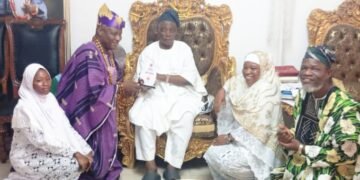As the world celebrate the passage of the phenomenal of a man called- Jimmy Carter, he was not a president of the first rank, but he survived and his impact resonated through the corners of the world by dint of hard work and determination and etched a global recognition in his post – office efforts and stamp his footprint on the sands of time. By devoting himself to the project of promoting world values – peace, political stability and progress. Cater became an iconic world leader, with an inspiring, if often contentious, legacy as a dogged peacemaker and ethical problem-solver.
A President who, while in office, was beset by a horrible economy, the Soviet invasion of Afghanistan and the seizure of American hostages in Iran. Jimmy Carter may be seen and regarded as a remarkable political failure with a greater stout and sturdy success than when he lost his reelection bid to Ronald Reagan in 1980.
All throgh his his stinct in office as US 39th President, unlike the present world of military intervention, it’s worthy to note that not a single bomb was dropped nor shots fired in combat by American Forces during Carter’s tenure. His leadership helped prevent at least major five wars in Panama, Israel, and Iran while he did not allowed the situation in Haiti and North Korea to escalate after he left office; Camp David accords he came up with was profound and successful treaty since the end of World War II.
Long before he died Sunday, December 29, at over 100, his epic journey from barefoot Georgia farm boy to Nobel Prize-winning humanitarian had become a classic American story of
the longest-lived president. Many historianshave underscored the fact that, Carter succeded to live through three centuries.
Born in a rural South Georgia in the 19th century. He advance the four great movements of the 20th century – civil rights, women’s rights, human rights world over and the environment and fast tracked the collapse of the Soviet Union. And as an old man of the 21st century, he ensured his Carter Center was on the cutting edge of the new millennium’s big challenges in conflict resolution, disease eradication, democracy promotion and sustainable development.
The President James Laney of Emory University in his assessment of the late activist Carte, he declared, “Jimmy Carter as the only person in history for whom the presidency was a launch-pad. By all standard, this is an honest truth; he reinvented himself as ex-presidency with a higher purpose that inspired other Presidents to use their stature, influence and his the ability to bring people together to address a common goal or issue on behalf of important causes after leaving office.
He was the longest-serving former president in American history and by the records the best, though every successor were upset that he sometimes meddle in the state affairs as if he were still in power. Carter who served only one term as President, and the only one from the state of Georgia to have led the country. He had previously served in the Georgia State Senate from 1967 to 1971 and as the 76th governor of Georgia from 1971 to 1975. Upon leaving the presidency, and through helps several activities across the world. He was the 2002 recipient of a Nobel Peace Prize for his promotion of human rights. A prolific writer and a leading commentator on global affairs.
Throughout his life, Jimmy Carter has been a steadfast advocate for the rights of the most vulnerable and has tirelessly fought for peace. In his Nobel award acceptance speech, President Carter said, ‘God gives us the capacity for choice. We can choose to alleviate suffering. We can choose to work together for peace.’ He made that choice again and again over the course of his 100 years, and the world is better for it.”
Another points that shoot up his administration ratings was his Africa relationsship as a continent. He had a long-lasting connection to Africa, both during his term in office from 1977 to 1981, and in the many decades afterwards. his upbringing in the rural southern U.S., which first made him aware of the evils of racism. Pundits praise Jimmy Carter’s achievements as the US president and extol his exemplary post-presidential years, they cited the recognition of China, the Panama Canal Treaties. Almost no one mentions what Carter, who has died, achieved in Africa during his presidency. This is considered as a serious oversight. There were several reasons for Carter’s focus on southern Africa. First, politics. Southern Africa was the hottest theatre of the Cold War when Carter took office in January 1977.
A year earlier, Fidel Castro had sent 36,000 Cuban troops to Angola to protect the leftist MPLA from a South African invasion backed by the Gerald Ford administration. The Cubans remained in Angola until 1991 .Mozambique was no longer governed by America’s NATO ally, Portugal, but instead by the left-leaning Frelimo . Apartheid South Africa – so recently a stable, pro-American outpost far from the Cold War – suddenly faced the prospect of being surrounded by hostile black-ruled states.
The unfolding events in southern Africa riveted Washington’s attention on Rhodesia, (now Zimbabwe) where the insurgency against the white minority government of Ian Smith was escalating. One week after the Carter administration took office it assessed the crisis in Rhodesia:
This situation contains the seeds of another Angola… If the breakdown of talks means intensified warfare, Soviet/Cuban influence is bound to increase. The administration knew that if the war did not end, the Cuban troops might cross the continent to help the rebels. He developed a proposal for peace with British officials, refusing to lift sanctions on the country until free elections were held, Carter did not falter in his position for majority rule. While his efforts to invoke a moral and regional approach to African affairs were not always supported domestically, Carter’s policies were different from those of previous presidents. His efforts resulted in the United States playing a major role in negotiating the end of the armed struggle.
His announcement that he would not lift sanctions against Salisbury, followed a quiet diplomatic offensive that began in April after “the Bishop” won controversial elections to lead to a carefully circumscribed form of black rule. The diplomatic campaign was aimed at obtaining support from black African countries as a prelude to Western recognition which had been a singular failure.
No black African country has given the Muzorewa Government so much as a nod of recognition. The unbroken opposition is remarkable, given Africa’s political splits and colliding spheres of influence. Even Malawi, which has taken a maverick course in African affairs to the extent of maintaining diplomatic relations with South Africa shown no inclination to lay down ties to Salisbury.
Carter also improved US relations with the continent as a whole. He increased trade, diplomatic contacts and, simply, treated Black Africa with respect.
During the war in the Horn of Africa, he resisted intense pressure to throw full US support behind the Somalis when the Somali government waged a war of aggression against leftist Ethiopia. His administration attempted valiantly to negotiate a settlement in Namibia and condemned apartheid in South Africa. Carter’s was the typical response of US governments to any perceived communist threat in Africa.
©️ Ogundipe, Public Affairs Analyst; Former President Nigeria and African Union of Journalists.













